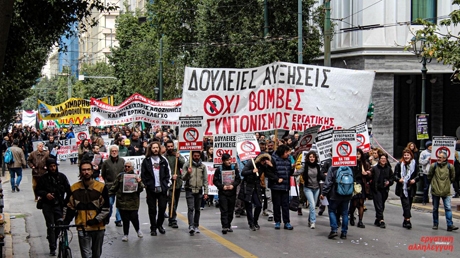News
You are here
Report: Greek workers on strike

April 11, 2025
Workers all across Greece went on strike on Wednesday April 9th. There were strike rallies even in small towns. In Athens, the Syntagma (Constitution) square in front of Parliament was full again and again as successive waves of strikers marched through.
This was the second General Strike in six weeks. February 28 was the two-year anniversary since the rail crash in Tembi in northern Greece that killed 57 people. Rail privatisation had meant that signals were not working, and two trains collided head on. The right-wing government of New Democracy tried to blame the crash on rail workers, and this has made people even more angry.
For two years, government intervention has obstructed justice. Evidence has been destroyed and parliament is sheltering ministers and government officials from prosecution. On 28 February popular anger exploded with a huge general strike.
Opinion polls show New Democracy losing half of its electoral support and people are losing confidence in the judiciary and parliament. There is a wave of radicalisation and this is affecting what is happening in the trade unions. There is a swing to the left.
Union of Hospital Doctors
One important example is what happened at the elections for a new Executive Committee in the Union of Hospital Doctors in the Athens-Piraeus district (EINAP). A group of conservative trade unionists allied to New Democracy had held control for over twenty years but this time they lost. Candidates supported by the Communist party polled 33.7 percent, a slate supported by the anti-capitalist left (including SEK) polled 23.7 percent, trade unionists close to the social-democratic PASOK 7.9 percent and SYRIZA 7.4 percent.
Hospital workers were at the forefront of the strikes defending the National Health Service (ESY) from cuts and privatisation. Public sector workers (civil servants, teachers, local authorities and health workers) used to be paid two extra monthly salaries as a bonus over the Easter, summer and Christmas holidays. This was cut when the European Central Bank and the IMF imposed austerity on Greece as a condition for rescuing the banks from bankruptcy in 2010-2015. Now workers are demanding a wage rise through the restoration of the “13th and 14th month salaries”.
It is in this context that the decision by European Union leaders to escalate arms spending through a programme named “ReArm Europe” has acted as a provocation. Greece already spends close to 4 percent of its Gross Domestic Product for the military. It ranks near the top among NATO members. On top of this, the New Democracy government led by Kyriakos Mitsotakis announced a plan to spend 25 billion euros for more armaments. And it gave military personnel a rise of 20 percent.
No wonder that the demand “Money for a wage rise, not for war” reverberated across workplaces and was a leading slogan among strikers on 9 April.
‘Patriotic’ Reformist Left
However, the leaders of the reformist Left are trying to deflect this pressure from below. One way of doing this is by insisting that the solution is not to cut arms spending but to make sure that some of the money is spent on the Greek arms industry. They claim that this will create some well-paid jobs and will boost the share of wages in the economy. This, of course, is no solution for teachers or nurses trying to make ends meet.
Another argument by reformist leaderships focuses on the need to keep up the arms race with Turkey. This “patriotic” section of the Left argues that the Greek government must prevent a war with Turkey by strengthening its military forces. As if preparing for war prevents war!
In reality, the expansion of Greek military capabilities is closely related to an alliance with Israel. Greek frigates are operating in the Red Sea against the Houthis in Yemen. Part of the €25 billion programme will be spent on buying anti-missile systems from Israel.
The Left must be clear in its opposition to “ReArm Europe” and to the drive to increase military spending. Our hope for preventing war does not depend on more armaments but on the internationalist unity of workers. Building links between strikers in Greece and the demonstrators fighting for democracy across Turkey is the way forward.
Strengthening the international movement of solidarity with Palestine is a shield against war because it can stop governments from supporting Netanyahu’s and Trump’s crimes in the Middle East. Demonstrators against Trump inside the USA, defenders of Irish neutrality in Dublin and workers going on strike in Athens – we all have a common cause.
We need a stronger revolutionary Left that argues for the overthrow of capitalism as a system that is becoming more catastrophic every day.
Reposted with permission from rebelnews.ie
Section:










